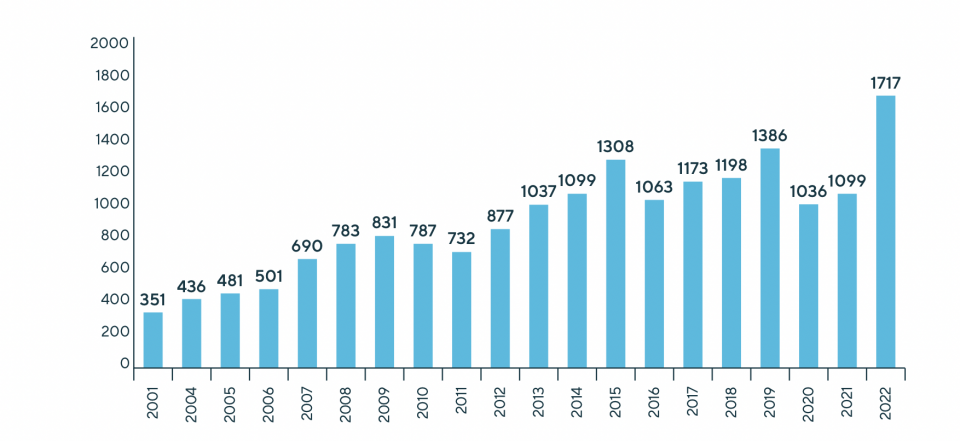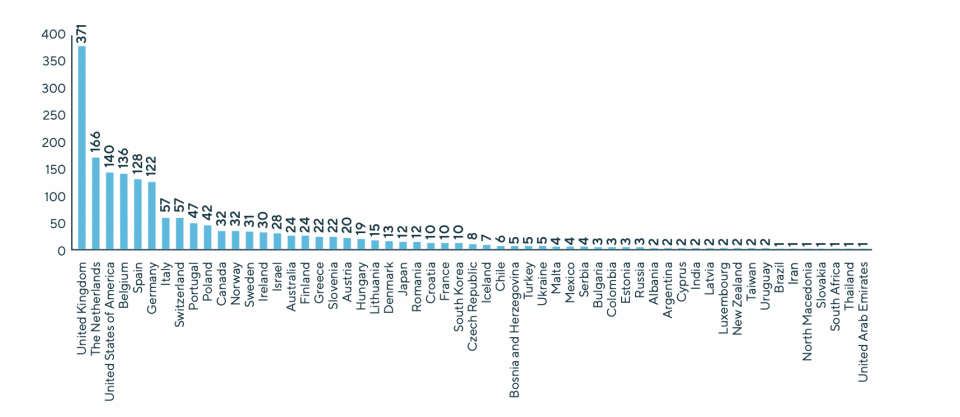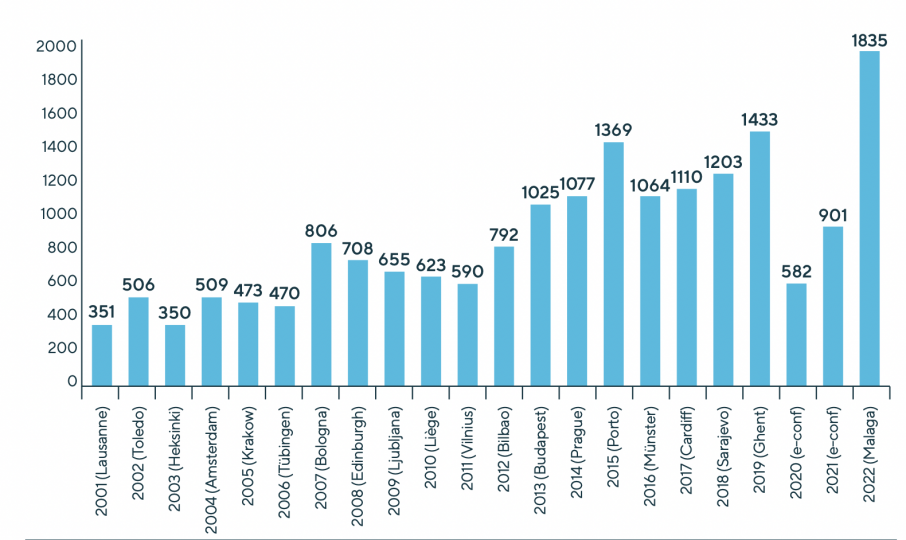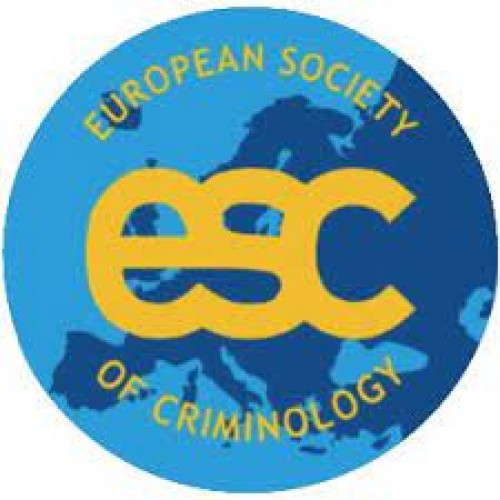ESC Executive Secretariat Annual Report 2022
In brief
The 22nd Annual European Society of Criminology (ESC) meeting was convened in Malaga, Spain, in September 2022, with an unprecedented 1875 attendees. This figure represents the most significant participation ever recorded at a Eurocrim conference and was coupled with a record number of 1717 ESC members. The ESC offered five fellowships to emerging criminologists from Albania, North Macedonia, Serbia, and Turkey. Additionally, two special fellowships were awarded to colleagues from Ukraine.
In terms of accolades, the 2022 European Criminology Award was bestowed upon Michael Levi, while Philippa Tomczak was honoured with the 2022 ESC Young Criminologist Award. The European Journal of Criminology Best Article of the Year 2021 Award was conferred on Aleš Završnik. Meanwhile, Seán Columb received the 2022 Book Award, and Michael Tonry was awarded the 2022 Distinguished Services to the ESC Award.
To address a significant backlog, the European Journal of Criminology published several issues comprising a higher number of articles than usual. The ESC Executive Board appointed Rita Faria as the incoming Editor of the ESC Newsletter, Csaba Györy as Conference Coordinator, and Dorel Herinean as Conference Implementer.
On April 21, 2022, the Board publicly expressed deep concern about Russia's aggression towards Ukraine through a Declaration —"Declaration of the Executive Board of the European Society of Criminology concerning the war in Ukraine”— published on the ESC website and included in this newsletter. The declaration was aptly titled.
The ESC membership elected Josep M. Tamarit-Sumalla as President-Elect, Ineke Haen-Marshall as an At-large Board member, and Daniel Fink as Auditor. On September 24, 2022, Klaus Boers assumed the role of President of the ESC, and Catrien Bijleveld transitioned to Past-President.
Trend in ESC membership from 2001 to 2022
After two years of strain and lifestyle changes due to the control measures imposed to reduce the spread of COVID-19, 2022 marked the return to a relatively routine activity for criminologists and they, quite rationally, choose massively to get together with their peers in “Malaga la bella”, as a poet labelled the city that hosted the 2022 Eurocrim conference. Such a gathering had a direct effect on the number of members of the ESC, as can be seen in Figure 1.

The Figure shows the trend in ESC membership from 2001 to 2022, except for the years 2002 and 2003, for which data are not available in the archives of the society. Clearly, the overall trend from 2001 is one of growth. Starting with 351 members in 2001, the membership increased substantially to 1,717 members by 2022, more than a four-fold increase.
However, this trend is not consistently linear and has been affected by two main factors. First, a significant dip is seen in the years 2020 and 2021 during the COVID-19 pandemic. Membership fell from 1386 in 2019 to 1036 in 2020, a decrease of about 25%, before rising slightly to 1099 in 2021. This is likely due to the shift from in-person to e-conferences, which led to a decrease in interest or availability to participate, probably due to the lack of personal interaction and networking opportunities typically found at in-person conferences. Second, as we have pointed out in several of our previous annual reports, the place where the annual conference takes place has a strong influence on the number of participants to it, which in turn translates into an increase in the number of ESC members who benefit from a reduced registration fee. As seen in Figure 3 (below), the conferences organised in Spain, Italy, Portugal and Belgium registered peaks in the number of participants, which also coincide with peaks in membership. In that context, the magnitude of the drop in membership from 2019 — when the conference took place in Ghent—to 2020-21 must be relativised. Keeping more than 1000 members — a number similar to those of 2013, 2014 and 2016 — during the COVID-19 pandemic highlights the resilience of the ESC during those challenging times.
The data for 2022 shows a sharp rebound, with the highest number of members ever recorded, at 1717. This could be a result of the pent-up demand for interaction and networking among criminology professionals following the pandemic years combined with the charms of Andalusia. In sum, the ESC has seen an overall increase in its membership from 2001 to 2022, with some significant year-to-year fluctuations, particularly during the pandemic years. These variations highlight the impact of external factors such as global events, conference location, and conference formats on the society's membership.
Geographical distribution of ESC members in 2022
Figure 2 illustrates the geographical distribution of the 1717 members of the ESC in 2022, presenting a compelling picture of the society's global reach. This distribution is surely influenced by factors such as linguistic and cultural proximity and the political, economic, and academic environment in each country. English-speaking countries or those with strong ties to English-speaking cultures may contribute with more members due to fewer language barriers. Besides, countries with a solid tradition of academic freedom and strong financial support for research might be expected to have higher participation than those with less favourable conditions.

It is pertinent to note that while the number of members from each country is influenced by the size of its population, a more meaningful comparative measure could be the extent of each country's criminological community. Possible operational metrics for the latter include the number of criminology programs, institutes, graduates, members of national criminological societies, or registered criminologists in countries with professional associations, such as the professional orders of Criminologists (Colegio Professional de Criminólogos) in Spain. Regrettably, the existing directories of national associations of criminology maintained by the ESC[1] and the ASC[2] are not exhaustive, and the Observatory on Academic Criminology Programs, established by the ISC and supported by the ESC, among others, is yet to be completed and has not been updated for several years[3]. This presents an opportunity for reactivating the ESC European University Curriculum Working Group, an initiative that would greatly benefit from the participation of motivated ESC members.
In the interim, we must base our discussion on the absolute figures shown in Figure 2. It is noteworthy that representation is drawn from the five inhabited continents represented by the Olympic rings: Africa, America, Asia, Europe, and Oceania. As is typical, the United Kingdom leads with the highest number of ESC members (371 or 22% of the total), followed by The Netherlands (166 members, 10% of the total) and the United States of America (140 members, 8.2% of total). The strong representation from the US as well as from other non-European countries—Canada (32 members), Israel (28), Australia (24), Japan (12), South Korea (10), Chile (6), Mexico (4), Argentina (2), India (2), New Zealand (2), Taiwan (2), Uruguay (2), Brazil (1), Iran (1), South Africa (1), United Arab Emirates (1)— highlights the ESC’s global appeal. All in all, 14% of the ESC members (248 individuals) come from non-European countries.
Belgium, Spain, and Germany also have substantial representation, each contributing with over 100 members (7.9%, 7.5%, and 7.1% of total membership, respectively). Indeed, it is worth considering the already mentioned impact of the location of the conference on the ESC members. The number of members from the host country or neighbouring countries, such as Portugal (47 members), is usually boosted. Together with Portugal, other countries with a significant number of members — between 2% and 3% in round numbers — are Italy, Switzerland, Poland, Canada, Norway, and Sweden. Finally, there are a few countries with one or two participants — such as Brazil, Iran, Slovakia, South Africa, Thailand, and the United Arab Emirates — who probably have a specific interest in European criminology or who have significant collaborations with European colleagues. In sum, the current geographical distribution of the ESC membership shows that it has become a truly international society.
Eurocrim 2022 in Malaga: The 22nd Annual Meeting of the ESC
Figure 3 shows the participation trend in ESC conferences from 2001 to 2022. We previously addressed how this trend correlates with membership growth, as depicted in Figure 1, hence we will not delve into that discussion again. A general growth trajectory is apparent, influenced by the varied conference locations, with a marked surge from 2021 (e-conference) to 2022. This spike aligns with the 22nd Annual ESC Meeting (Eurocrim 2022), held in Malaga from September 21-24 2022, which attracted an unparalleled 1875 attendees.

Among those present were five young criminologists from Albania, North Macedonia, Serbia, and Turkey who were granted the customary ESC fellowships to attend the Society's Annual Conference. Considering the extraordinary circumstances precipitated by the conflict in Ukraine, the ESC Executive Board resolved to extend additional fellowships to colleagues from the affected region. Two Ukrainian criminologists applied and were granted these fellowships, albeit only one ultimately managed to attend the event. The Board announced these fellowships on April 22, 2022, along with a declaration expressing profound concern regarding Russia's aggression against Ukraine. The full declaration can be accessed in this Newsletter and on the ESC website.
Seventy-two per cent of attendees were ESC members, with the remaining 28% non-members. Intriguingly, a similar breakdown appeared when comparing educational status — non-students, or more accurately "former students," versusstudents — which also presented a 72-28 per cent distribution. This was the highest student turnout ever recorded, considering that students comprised 22-25% of participants in past conferences. Similarly to the geographic distribution of ESC members shown in Figure 2, all five inhabited continents were represented at Eurocrim 2022.
Given that 28% of conference attendees were non-ESC members, we can conclude that in 2022, the ESC community expanded to encompass 2243 criminologists (1717 members and 526 non-members who attended the conference).
The 2022 Eurocrim conference further consolidated the organisational structure implemented during the 2020 and 2021 e-conferences. In light of this, Csaba Györy (from Eotvos Loránd University, ELTE, and the Hungarian Academy of Sciences, Budapest, Hungary) and Dorel Herinean (from the University of Bucharest, Romania) were appointed respectively as Conference Coordinator and Conference Implementer by the ESC Executive Board. Also, new professional software was introduced for abstract submission and a separate one for the conference app. The local organisers handled the conference's scientific program during the first twenty ESC conferences — from abstract submission to panel assembly, encompassing abstract peer review. However, as participant numbers steadily increased (see Figure 3), this system showed limitations. In that context, our deepest gratitude is extended to the chairs of the over thirty ESC Working Groups who served as abstract peer-reviewers and assembled the sessions for their thematic areas. Without their invaluable contribution, organising the 2022 e-conference would have been impossible. More details about these organisational shifts can be found below, in an article by Csaba Györy and Marcelo Aebi.
ESC Awards
In 2022, the ESC delivered five awards: The ESC European Criminology Award, the ESC Young Criminologist Award, the European Journal of Criminology (EJC) Best Article of the Year Award, the ESC Book Award, and the Distinguished Services to the ESC Award. The awardees received their plaques and diplomas in two ceremonies that took place during the 2022 Eurocrim conference.
2022 European Criminology Award
Michael Levi, Professor of Criminology at the University of Cardiff, Wales, United Kingdom, received the 2022 ESC European Criminology Award in recognition of his lifetime contribution to criminology. The award committee was composed of former ESC presidents Tom Vander Beken (Chair, Ghent University), Lesley McAra (University of Edinburgh) and Aleksandras Dobryninas (Vilnius University). An impressive laudatio of Michel Levi was pronounced by Letizia Paoli in Malaga and has been published in the previous issue of this Newsletter (2023/1: pp 8-11). In the same issue, readers will find the acceptance speech of Michael Levi, entitled “Criminology is a never-ending story” (pp. 12-15). It is undoubtedly a piece to remember, written — and pronounced in Malaga — with Michael’s inimitable style that combines science, humour, wisdom, humanism, savant references, and irony.
2022 ESC Young Criminologist Award
Philippa Tomczak from the School of Sociology and Social Policy at the University of Nottingham, England, United Kingdom, received the 2022 ESC Young Criminologist Award in recognition of her article “Reconceptualizing multisectoral prison regulation: Voluntary organizations and bereaved families as regulators” published in 2021 as Online First, in Theoretical Criminology. The award committee — composed by Lesley McAra (Chair, University of Edinburgh), Fernando Miró (Miguel Hernández University of Elche, Spain) and Olga Petintseva (Ghent University, Belgium) — considered that “Tomczak’s article takes as its empirical focus the theme of prison suicide and explores the ways in which voluntary organisations and bereaved families can act as ‘regulators’, driving change in prison regulation and culture, even although such groups are often silenced within, absent from, official narratives. The theoretical contribution stems from the application of processual social ontology, predicated on the possibility of transformation in social phenomena. The article deploys empirical evidence from a qualitative research project, with documentary analysis, interviews with multisectorial stakeholders and analysis of over 100 fatal inquiry investigations. The article concludes with the positive assertation regarding the possibility of penal change. […]. The Jury also agreed that Tomczak’s work had important practical implications demonstrating the significance and rigour of her empirical work”. Philippa Tomczak presented her research on prisoner deaths in the previous issue of this Newsletter (2023/1: pp 16-17).
EJC Best Article of the Year 2021 Award
Aleš Završnik, from the Institute of Criminology at the Faculty of Law of the University of Ljubljana, Slovenia, received the ESC European Journal of Criminology Best 2021 Article award in recognition of his article “Algorithmic justice: Algorithms and big data in criminal justice settings”, published in issue 18/5 (pp 623-642) of the EJC. The award committee — composed by Catrien Bijleveld (Chair, NSCR and ESC President at the time), Janna Verbruggen (Vrije Universiteit Amsterdam and winner of the Award in 2021) and Kyle Treiber (University of Cambridge and EJC Editor-in-Chief) — consider that the article “draws scholarly attention to a contemporary topic which is largely overlooked but critically important to emerging criminal justice practices. The paper is broad to the point of multidisciplinarity in scope, presenting an inventory of possible ways algorithms and big data could be and are being used across diverse areas of criminal justice and law, with the potential to influence, and in some instances already actively influencing, the identification, adjudication, management, and treatment of offenders. In doing so Završnik’s paper raises many critical points regarding the efficacy, reliability, and ethics of these approaches, identifying and detailing an array of important issues which will no doubt inspire and underpin future empirical research. Overall, the jury felt Završnik’s paper best exemplifies the aims of the European Journal of Criminology, and the European Society of Criminology which it represents, to foster scholarly debate about topics and practices in European criminology and criminal justice, especially those which may be both fundamental and radical in shaping our perspectives on criminal justice and how we address the problem of crime.”
2022 ESC Book Award
Seán Columb, from the School of Law and Social Justice at the University of Liverpool, England, United Kingdom, received the 2022 ESC Book Award in recognition of his book Trading Life: Organ Trafficking, Illicit Networks, and Exploitation, published in 2021 by Stanford University Press. The award committee—composed of Andra-Roxana Trandafir (Chair, University of Bucharest, Romania), Ronald van Steden (Vrije Universiteit and NSCR, Netherlands), and José Becerra-Muñoz (University of Malaga, Spain) — considered that the book “provides an in-depth analysis of organ trafficking and the connections of the existing black market with health and criminal policies. The author’s study is informed by over 60 interviews, out of which thirty-one of them to organ sellers, seven to organ brokers, nine to organ recipients, seven to medical professionals, two to international law enforcement officials and seven to NGOs staff members, which gives a unique insight of their situations. The author pays much attention to the victims of organ trade. His normative point is that the murky business of selling and buying organs stems from a combination of harsh state policies and the vulnerable situation of illegal migrants, who are recruited to sell their kidneys. Although the book is mainly based on fieldwork in Egypt (the author travelled there from 2014 to 2020), it speaks to an international criminal audience and beyond. Organ trafficking, as a form of organized crime, is a global problem and very much appeals to people’s imagination. The book confronts the deep, root causes of the problem, mainly connected to poverty. It connects health, migration and criminal policy to uncover a strategy that focuses on criminalization to avoid discussions about the failure of the system in many aspects. The author gives detailed and vivid empirical descriptions of how organ trade networks operate. Theoretically, the study contributes to debates about organized crime and illicit networks that intersect with legal (medical) institutions. The methods used are, therefore, relevant, appropriate and allow the author to describe and discuss the topic from different perspectives. The work is successful in widening the traditional focus on the problem, going beyond data and figures of organ smuggling to learn about a complex system in which incentives and trade-offs are studied from a holistic point of view. In the final chapter, the author discusses policy implications arising from his work. He, for example, proposes an alternative, de-criminalizing regulatory policy response to organ trade. The author’s viewpoint is controversial, yet refreshing and relates to his position that the precarious context of illegal migrants plays a large role in understanding why illegal organ transplant and trade are currently taking place. The author has an accessible writing style, being a mixture of journalistic observations (the book contains – sometimes disturbing – photographs) and concise academic research. Briefly, the book is a very ambitious and quite unique piece of research that deals with a global problem. The author manages to avoid simple North-South, rich-poor arguments, which, despite being crucial, are taken even further to expose how different policies on different topics and countries shape a complex network of incentives resulting on a cruel black market.”
2022 Distinguished Services to the ESC award
Michael Tonry, one of the founders of the ESC, former President, and Editor of the ESC Newsletter during the first ten years of the society, received the 2022 Distinguished Services to the ESC Award in recognition of his outstanding service contributions to the effective functioning of the European Society of Criminology. The award committee was composed by Aleksandras Dobryninas (Chair, Vilnius University), Klaus Boers (University of Münster) and Csaba Györy (Eötvös Loránd University, ELTE). Csaba Györy pronounced the laudation — which can be found below — during the Awards ceremony in Malaga, which was followed by a moving and bright acceptance speech from Michael Tonry.
Briefs
Elections: In 2022, for the third year running, ESC members utilised an electronic voting system facilitated by the University of Lausanne. The outcome of the vote saw Josep M. Tamarit-Sumalla appointed as President-Elect, Ineke Haen-Marshall as an At-large Board member, and Daniel Fink as Auditor.
European Journal of Criminology: Regular readers of the European Journal of Criminology and ESC members may have noticed the recent issues of the journal carrying a larger-than-normal quantity of content. This arises from concerted efforts to shrink the journal's backlog, leading to an increased number of articles in each issue. This temporary measure is expected to continue until approximately mid-2023.
ESC Newsletter: At the 2022 Eurocrim conference, the ESC Board evaluated candidates who responded to the call for the ESC Newsletter Editor position and selected Rita Faria (University of Porto, Portugal) for the role. Rita commenced her tenure at the year's end, succeeding Csaba Györy, who had been in the role since 2011.
ESC Working Groups: The number of ESC working groups continues to grow, with the current tally exceeding thirty. This expansion has led the ESC Board to implement two key guidelines when evaluating proposals for new working groups:
(1) they must not overlap with existing groups, and
(2) they must garner support from at least ten ESC members, creating a sizeable network.
It's also worth reiterating, as stipulated in the ESC Constitution, that all Working Group members must be current ESC members. Furthermore, Chairs of these groups are asked to assist in organising ESC conferences by peer-reviewing abstracts and assembling the respective panels.
ESC Summer School: The General Assembly endorsed the establishment of an ESC Summer School, a project subsequently stalled due to the COVID-19 pandemic. The project has been revitalised, and the Board plans to present a detailed proposal at the 2023 General Assembly, aiming to launch the inaugural summer school in 2024.
European Criminology Oral History Project (ECOH): The return to in-person conferences enabled José Angel Brandariz (University of A Coruña, Spain), who heads the ECOH project, to organize five new interviews for the project. In Malaga, a series of interviews took place: Catrien Bijleveld was interviewed by Elanie Rodermond, Miklós Lévay by Éva Inzelt, Gorazd Meško by Rok Hacin, Rossella Selmini by Alessandro Corda, and Tom Vander Beken by Jelle Janssens. These interviews are now available on the ESC's YouTube channel.
Future Conferences: The 23rd ESC Annual Meeting is scheduled for September 6-9, 2023, in Florence, Italy. The 24th Conference will be held in Bucharest, Romania, from September 11-14, 2024. The 25th Conference is set for Athens, Greece, from September 3-6, 2025.
Keeping in touch: If you want to stay up to date with the latest ESC news, please visit the ESC website http://esc-eurocrim.org/, the ESC Newsletter website https://escnewsletter.org/, follow us on Facebook (https://www.facebook.com/groups/110696536816) and Twitter @esc_eurocrim (https://twitter.com/esc_eurocrim), and watch the YouTube channel of the ESC (https://www.youtube.com/channel/UCommPTU1z27MXC9rFlkCz6w).
[1] https://www.esc-eurocrim.org/index.php/activities/links#Societies.

